India world’s top arms importer between 2019-23: SIPRI

- 13 Mar 2024
Why is it in the News?
India was the world’s top arms importer for the period 2019-23 with imports having gone up by 4.7% compared to the period 2014-18, according to the SIPRI.
Highlights from the SIPRI Report 2023:
- The report highlights that India continues as the world’s largest arms importer, maintaining this position despite ongoing efforts to enhance its defense-industrial base, accounting for a significant 9.8% of global arms imports between 2019 and 2023.
- There has been a steady increase in India's arms imports, with a 4.7% rise observed between 2014-18 and 2019-23, attributed in part to emergency procurements prompted by the prolonged military standoff with China.
- The dynamics of arms suppliers are changing, with Russia historically serving as India's primary weapons supplier, still accounting for 36% of its arms imports, although there is a shift towards diversification, with India increasingly turning to Western countries and domestic manufacturers.
- Notably, between 2019-23, Russian deliveries constituted less than half of India's arms imports for the first time since 1960-64.
- Western suppliers like France and the United States are emerging as key players, collectively accounting for 46% of India's arms imports, with significant contracts in progress, such as India's procurement of 31 armed MQ-9B Sky Guardian drones from the US and 26 Rafale-M fighters from France.
- In the global arms trade landscape, India ranks as the top importer, followed by Saudi Arabia, Qatar, Ukraine, Pakistan, Japan, Egypt, Australia, South Korea, and China, while the United States leads among exporters with a 42% share, followed by France and Russia.
- India's role as a major arms customer is underscored by its position as the largest arms customer for France, Russia, and Israel, highlighting its significance in global arms procurement.
- Meanwhile, China remains a dominant supplier to Pakistan, accounting for 61% of its exports, and also exports 11% of its arms to Bangladesh, consolidating its influence in the region.
Challenges Encountered by India in Indigenous Production of Defense Equipment:
- Efforts to promote indigenous defense production, exemplified by initiatives like 'Make in India', have encountered persistent challenges, notably the failure to materialize any projects under the Strategic Partnership (SP) model, which was introduced to foster collaboration between the public and private sectors within the defense industry.
- The SP model, designed to facilitate joint endeavors between government-owned defense entities and private companies, has yet to yield tangible results, necessitating a thorough review of the policy framework.
- Key areas for improvement include a reevaluation of pricing methodologies, ensuring long-term orders to sustain production, and addressing bottlenecks that impede project implementation.
- Furthermore, India's defense sector has seen minimal Foreign Direct Investment (FDI), amounting to only Rs 5,077 crore since the sector was opened to private companies in 2001.
- Despite efforts to liberalize FDI regulations, such as allowing up to 74% through the automatic route and up to 100% through the government route in 2020, investment inflows remain disproportionately low.
About Stockholm International Peace Research Institute (SIPRI):
- The Stockholm International Peace Research Institute (SIPRI) is a renowned independent international institute committed to investigating various aspects of conflict, armaments, arms control, and disarmament.
- Founded in 1966 and headquartered in Stockholm, Sweden, SIPRI consistently ranks among the world's most respected think tanks.
SIPRI's mission is multi-faceted and encompasses the following key objectives:
- Conducting in-depth research and activities related to security, conflict, and peace, with the aim of developing a deeper understanding of the complex factors that influence global stability.
- Providing insightful policy analysis and recommendations to policymakers, international organizations, and civil society actors, helping them make informed decisions and develop strategies to address security challenges.
- Facilitating dialogue and building capacities among various stakeholders, including governments, academia, and non-governmental organizations, to foster cooperation and promote mutual understanding on peace and security issues.
- Promoting transparency and accountability in the field of international security by maintaining comprehensive databases on arms transfers, military expenditure, and other relevant data, which contribute to a more accurate assessment of global security trends.
- By adhering to these core principles and objectives, SIPRI plays a vital role in advancing the global discourse on peace and security, while supporting efforts to mitigate conflict and promote stability worldwide.
